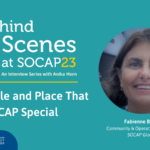A panel representing key parts of the social innovation supply chain discussed the importance of flexibility, stakeholder engagement, and customizing solutions to individual needs in shaping exit strategy for good economy start-ups. Root Capital and Good Capital represented the nonprofit and for-profit sides of investment firms, while BetterWorldBooks and AlterEco provided the social startup perspective.
Food for thought from this session:
- Debt and equity expectations are still determined by tradition bifurcations of business vs. nonprofit categories. Creating innovative financial structured deals can be challenging because stakeholders maintain old expectations conforming to legal entity status. Practicing flexibility and the ability to tailor solutions to each stakeholder empowers the ability to maneuver in frozen markets, though it may create a more piecemeal and time-intensive solution. For example, BetterWorldBooks benefited from a put-call arrangement with their investors, which limited the growth of liability on the startup side.
- Social entrepreneurs must think strategically about the true meaning of exit and how it might influence their social venture. Though founders are often creating new business models, relationships, and ways of interacting, exit can also create strife and the social benefit may be lost if the new management team does not understand the principles and values of the original startup.
- Because the timeline of venture capital and the timeline of impact are not same, it’s important to embed mission insurance in a social startup’s deal structure. Time horizons are not always the best fit for mission and entrepreneurs.
- Exits should come organically with opportunity and time. From an investor’s standpoint, extracting arbitrary timelines from entrepreneurs is not always healthy, even though liquidity and events are desired. Nuanced social businesses sometimes look at time horizons of multiple decades, so the short time horizons used by conventional investing can be harmful. A holding company might be used to create “little Berkshire Hathaways for good” and set up a healthy time horizon of a decades to enable change.
By SOCAP13 Volunteer Grace Chang



